Summary 
Strong outdoor production of the difficult comedy-drama, with an adorably resolute Helena in passionate but unrequited romance with the nobleman Bertram. Traditionally staged with fine supporting performances in an intelligent and refreshingly understated plumbing of a complex text.
Design
Directed by John Langs. Costumes by Robert Morgan. Set by Takeshi Kata. Lights by Michael A. Peterson. Sound and original music by Sarah Pickett. Choreography by Ally Carey.
Cast
Jonathan Smoots (King of France), Michael Huftile (Duke of Florence), Matt Schwader (Bertram), Tracy Michelle Arnold (Countess of Rossillion), Ally Carey (Helena), John Pribyl (Lafew), Jim DeVita (Parolles), Sarah Day (Widow), Susan Shunk (Diana).
Analysis
John Langs' production of All's Well That Ends Well is staged "up the hill" at American Players Theatre (APT) in a deep-woods outdoor setting that provides its own intimacy. Langs' staging is traditional - male courtiers costumed in black, white and gray, with powdered gray wigs plus collars, gloves, and white knee socks, and curly-haired French soldiers in mutton chops and mustaches, wearing stiffly formal and big-buttoned late 18th-century military uniforms - and he presents an understated interpretation of the questionable romance. The production begins with whispering sound effects then the blare of horns as an onstage platform and stairs are lit in crimson red for somber pallbearers bringing in the black-and-gold coffin of the Count Rossillion.
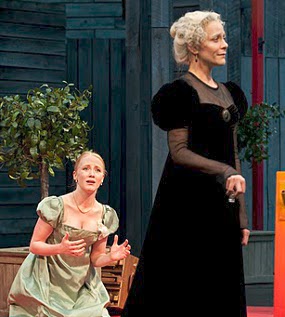
The resilient Helena is played by Ally Carey with wide-eyed charm, a pale-skinned and expressive young woman rushing onstage then to Bertram's side upon a downstage ramp. Carey, who also choreographed the production's dance sequences, wears an emerald-green gown and her blonde hair back in a bun, and she delivers a brief 1.1 soliloquy amid somber musical tones. Her charming of a slew of characters - as well as the audience - begins in 1.3 when she reveals her deep love for Bertram from high within the ampitheatre. The Countess Rossillion nods knowingly onstage, her gentle smile and folded hands a simple blessing of the depth of Helena's feeling, and Helena moves to center stage to disclose her intentions to travel to Paris. She methodically unfolds the legs from her omnipresent medical briefcase/suitcase with an almost obsessive-compulsive determination. During 2.1 at court, Carey's Helena is kindly reminded by the typically gruff Lafew to curtsy before the King, and she returns a finger-wave from the smitten Parolles. By 2.3 she has thoroughly charmed the King of France, who extols her virtues - "she is young, wise, fair" - to his gathered soldiers. Helena even manages to sway the angry Diana, who bares her nails at her in 3.5 and refuses to shake hands in 3.7, but by 4.4 is converted by Helena's resolute charm - "all's well that ends well" - and becomes an ally in the conclusion at court.
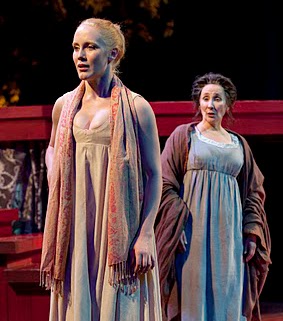
Carey's Helena elevates the entire production, determined before royalty - "unpitied let me die" - in 2.1, then smiling and lovely in a yellow gown for the 2.3 celebration of the King's return to health, but stricken and embarrassed once rejected by Bertram. She displays her resolve even after being denied by her love, spinning in 2.5 to toss confetti in the air and squeal - "whee!" - in beaming happiness. Carey's Helena makes an adorable Pilgrim in 3.5, wearing a brown gown with white gloves and a yellow cap, a crucifix prominent around her neck, as she deigns to pretend to be a man and bands together with the Widow and Diana in an elaborate - albeit disturbingly deceitful - plot to ensnare Bertram.
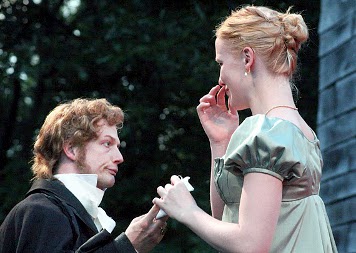
Any mutuality of feeling between Carey's Helena and the soldierly Bertram is suspect from the beginning. When she is moved to tears at the 1.1 funeral, Bertram offers her his handkerchief, but he reveals a lack of awareness of her feelings when he announces his plans to journey to the court at Paris, leaving Carey's stunned Helena - "I am undone, there is no living, none" - swooning in loss. When up-and-coming APT leading man Matt Schwader rushes from the stage as Bertram in youthful bluster, Carey's Helena desperately tries to follow. Helena's social position is apparent during 2.1, when she receives half-hearted applause from the ranks of young soldiers, and her romantic position is revealed when Schwader's embarrassed Bertram throws his head back and rolls his eyes at her surprise appearance. The wide-eyed soldiers parade before her in abject fear that Helena will select them as her husband - one waving in relief to his waiting girlfriend as he hurriedly exits the stage - and Helena must hide behind the King from Bertram's wounding words when he is selected. There appears to be no chance for true romance between the two, especially by the derisive way Schwader's Bertram speaks about Helena - "here comes my clog" - and his strained patience at her insistence: "let...that...go." When Helena moves to him, Bertram stalks away, and after she departs, he vows, "go thou toward home; where I will never come." Carey's wounded Helena repeats his words in 3.2 - "'till I have no wife, I have nothing in France" - and she eavesdrops on his determination to not be her husband until she wears his ring and bears his child. Still not deterred, Helena perseveres after watching - concealed between hanging laundry sheets at the opposite side of the stage - Bertram's 4.2 flirtation with Diana.
Schwader's haughty Bertram - echoing his 2009 portrayal at APT of Henry V certainly in personality if not at all in physical appearance - is initially flustered at the unexpected prospect of marriage to the lowly Helena, stuttering "my my my wife!" before becoming resolved and "forfeited to cares forever." Posed and standoffish in a green coat that recalls Helena's emerald gown, Schwader's Bertram chooses the danger of war over marriage beneath him, and Langs presents 3.1 with dramatic suddenness, as the now yellow-lit stage swarms with wheeled carts and staggering soldiers carrying lit torches to the sound effects of a raging battlefield. Wounded soldiers squirm and groan, one enduring a graphic downstage surgery amid yells of pain as other infantrymen shout and cower from artillery fire. Bertram's letter home is read from deep within the audience, the Countess worried upstage; and as Helena wrings her hands above, Bertram knife-fights a captured enemy soldier onstage in 3.3. Music grows louder amid flashes of light during the tense fight sequence, and when Bertram emerges victorious after a brutal stabbing, the music stops and lights fade as the Florentian soldier bleeds out.
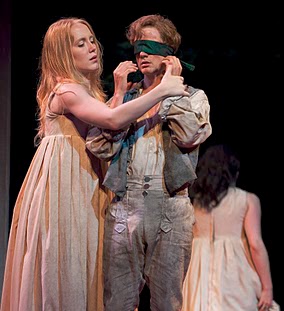
Schwader's Bertram appears to be enervated by his battlefield experiences, splashing his face sullenly with water from a bucket 3.6, then soliloquizing before half-heartedly pursuing Diana in 4.3: "here, take my ring; my house, mine honour, yea, my life." Blindfolded and tricked, Bertram does not realize the woman he is about to bed is Helena, glowing with her hair down, later exiting with a smile as she moves downstage with her legged suitcase. Bertram wears his green coat like a cape in 5.3 - "since I have lost, have loved" - and after a Parolles-like spasm of lies, he appears shocked by the supposedly deceased Helena, alive in the balcony, pregnant with his child and wearing his prized ring. He then moves forward and kneels before her, and when Helena pulls him to his feet - "will you be mine?" - he sincerely tells the King, "I'll love her dearly, ever, ever dearly," still seeming not so much changed in his feelings toward her as changed by the wartime experience in general.
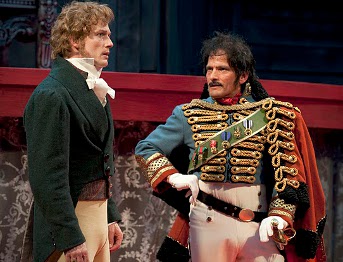
Langs enhances the stately production with fine supporting performances, especially an understated Parolles from Jim DeVita that is a refreshing departure from the usual oafish blowhard clown. DeVita's Parolles appears in 1.1 with his mustache and funky black hair sticking straight up in the front, looking somewhat like a stoner college student at a Halloween party in his military uniform. He blunders a flirtation with Helena - "are you meditating on virginity?" - and poses in his black boots and red cape with yellow braids. He shows little of Bertram's vigor, giving just a half-hearted "to the wars!" in 2.3, and during 2.5 he endures criticisms from LaFew - to Bertram: "pray you, sir, who's his tailor?" - who describes him as "once heard and thrice beaten" and advises Bertram to "trust him not in a matter of heavy consequence." Unlike Bertram, DeVita's Parolles runs away from the sounds of battle 3.1, and when "captured" and blindfolded by his fellow French soldiers 4.2, he cries out "o ransom, ransom!" and by 4.3 is revealing military secrets. Less a comic foil than a soft-spoken coward - "I love not many words" - he sits in shame alone 4.3, left only to the noise of crickets after humiliating himself, and 5.2 he indulges in self-pity back at court: "I am a man fortune has cruelly scratched."
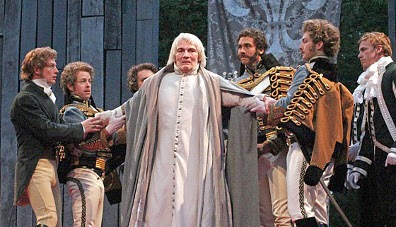
Other supporting performances are uniformly strong, from a normally sharp-tongued Lafew moved at the union of Helena with Bertram - "mine eyes smell onions" - to the elegant Countess in a black floor-length gown, leaning on her cane as she smiles at Helena 1.3 or trembling with illness above as Bertram suffers during the war with Florence. Jonathan Smoots also stands out as the King of France, a gray-haired monarch staggering 1.2 to his white-cushioned silver throne, nearly collapsing - "lend me an arm" - before returning 2.1 in a wheelchair. He rises and dances as banners unfurl, demonstrating his return to health, and he slyly advises his young military commanders: "those girls of Italy...take heed of them." Smoots' King proves himself an interesting complexity, being both wise - "praising what is lost makes the remembrance dear" - as well as petulant, as when he shoves Bertram for rejecting Helena or in his dismissal of Diana with, "take her away, I do not like her now!"
But Carey's performance as Helena is the heart of Langs' production, imbuing a smart and elegant presentation with an aching sense of impossible - nearly impossible - desire.